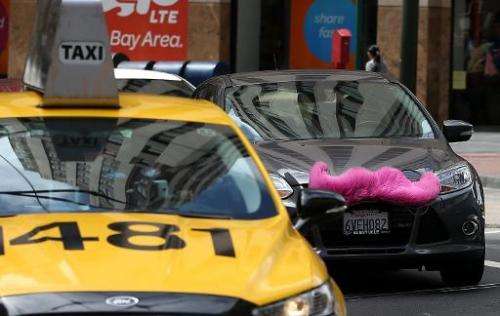A Lyft car drives next to a taxi on June 12, 2014 in San Francisco, California
The battle between ride-sharing and traditional taxi service is heating up in New York, with a new rival for ride-seekers declared illegal even before launching.
Lyft, a ride-sharing service that operates in 60 US cities and competes with the likes of Uber, announced plans to launch Friday in the city boroughs of Brooklyn and Queens, claiming these communities are "vastly underserved" by existing transport options.
Lyft said it had recruited 500 drivers in the Big Apple and that 75,000 New Yorkers had downloaded its mobile application ahead of the launch.
San Francisco-based Lyft contends the service, which uses a smartphone app and geolocation, is needed and saves money for consumers.
But the city's Taxi and Limousine Commission (TLC) quickly sought to put the brakes on the new service.
The municipal agency said in a statement that Lyft "is unauthorized in New York City" and has failed to comply with safety and licensing requirements.
"Lyft does not hold a license to dispatch cars to pick up passengers. In keeping with the TLC's priority of protecting public safety and consumer rights, the agency will be conducting enforcement operations to ensure compliance with the city's rules and laws," the statement said.
Drivers who work for Lyft run the risk of a $2,000 fine, officials said.
The squabble over Lyft is the latest in a simmering war that has played out in cities around the world, where new car-dispatching apps have been challenging the regulated taxi services.
Uber strikes back
Despite these flare-ups, Uber has spread to 147 cities in 41 countries, and has attracted investors that have pushed its market value up to a whopping $17 billion.
Uber, which offers a variety of services from limousine to taxi to ride-sharing, has responded to the arrival of Lyft with a rate cut of 20 percent for its UberX car-share service, and says its rates are lower than those of the city's familiar yellow taxis.
But the city's taxi operators are not taking this lightly.
Ethan Gerber, executive director of the Greater New York Taxi Association, said the move to cut prices is "a desperate attempt to penetrate a market in an unsustainable way."
He said the city's yellow taxis are "the most reliable, most regulated cabs" for consumers and that and Uber's price-cutting is "more about generating publicity then building a solid product."
The stakes are high for taxi operators, who pay up to $1 million for the city "medallion" which allows them to operate—a number limited to 13,600.
The city recently authorized 5,200 "green taxis" to serve the outer boroughs and parts of Manhattan that see few of the traditional yellow ones.
But that has not deterred services such as Lyft and Uber, which contend more rides are needed.
Lyft appears to be revving up for its New York launch, despite the threat of fines.
According to a statement to several media outlets, Lyft said the city's licensing rules don't apply to its rideshare model.
Mayor Bill de Blasio expressed hope for a compromise.
"I think there is more work that will be done by the (taxi commission) in the months ahead, trying to make sense of how to approach the Uber issue in a way that is fair to all concerned," he said this week.
"So right now we're governed by law. I think there is more policy making ahead."
© 2014 AFP




















